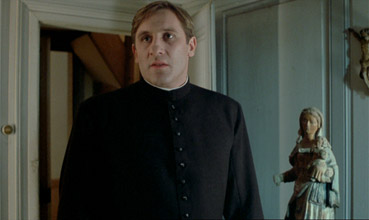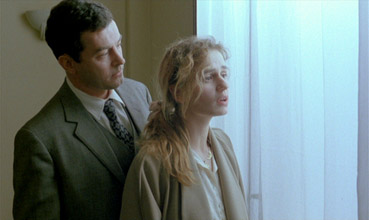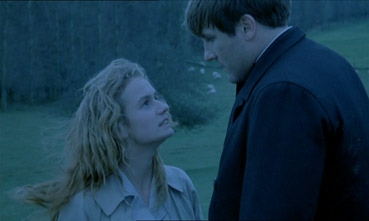|
Sous le soleil de Satan is a story thick with the syrup of the Catholic faith. It centers on a challenged priest who believes that God is abandoning his flock, leaving their souls open to the corrupting influence of Satan. The film is an adaption of a novel by the radically religious French author Georges Bernanos, directed by self-depreciating atheist auteur, Maurice Pialat. Satan is released under Eureka's Masters of Cinema label and, while Pialat is undoubtedly one of France's finest directors, his lead actor is equally worthy of the title. Wrestling at the heart of Satan's deep quandary is Gérard Depardieu. "I wouldn't have wanted to make this film with any other actor," proclaimed Pialat, shortly after film won the Palme D'or at the 1987 Cannes Film Festival. It's a grandiose claim, but watching the sheer mastery of craft Gérard brings to his performance, you believe all of Pialat's grandstanding.
Satan charts the travails of Donissan, a young priest with a hint of mental instability, as he struggles to find his place in the world, becoming more and more convinced that he and those around him are deeply corrupted by the influence of Evil. Trying in vain to keep him on the devout straight and narrow is Dean Menou-Segrais, a rare acting role for Pialat himself. By 1987, Pialat and Depardieu had made a number of films together and evidently shared a deep respect. This connection results in a father/son dialogue that is easily the most convincing relationship in the entire film. For much of the narrative, Donissan is a lonely figure, wandering the mental and physical wilderness in search of the meaning he feels his life lacks. Ultimately he is never happy, doomed to quite literally flagellate himself again and again, hoping to drive out impurities only he can see.

Across the divide is Mouchette (Sandrine Bonnaire), on whom the film lavishes much of its first half. The 16-year-old seductress is a lithe poison for her older lovers, one of whom she claims has impregnated her. Bonnaire flits from eyelid batting to dangerous rage in a mostly convincing fashion, an creature as troubled as Donissan. Without the strictures and moral weight of religion she rebels against her traditional French environs using the most potent weapon she has – sex. Eventually she will collide with Donissan, who styles himself as her saviour, but botches his attempt at redemption with disastrous results. He is cast out by the Dean, and the second half of the picture traces his absolution in pastures new. When we rejoin him, it seems that he has discovered his place in the world, but, despite the adulation of his new community, cannot escape the idea that he is a failure. Coupled with this is his corrosive certainty that God's influence is seeping out of the world, to be replaced by the debasing work of Satan.
This is a film with deep ideas and extremely interesting characters. The story of harsh faith seen through Pialat's doubtful lens is intellectually engaging without being pretentious. There is enough in the narrative to spend hours thinking about, which makes some of the editing decisions all the more confusing. Satan insists that the viewer perform some heavy mental exercise just to keep up with the action. A dip into the extras on this new DVD release reveals that the transitional and explanatory scenes were purposefully removed. The immediacy of the action undoubtedly creates a tone that suits the story more than an exposition rich version would, but it comes at a great cost. There are huge leaps in time and place throughout that are neither telegraphed nor reported from scene to scene. The acting, direction, and overall filmmaking craft on show is occasionally breathtaking, but much of it is missed as the audience scrabble to catch up with the where, when, and why of events. In the scene were Mouchette and Donissan meet, the clergyman appears to know secrets it seems he should not. Mouchette believes she has been overheard talking in her sleep, but Donissan hints at divine intervention. As a viewer you are forced to spend so much time wondering about the source of his privileged knowledge that you miss some wonderful moments of connection between the two actors. A scene was shot which explains how Donissan has come to know all about Mouchette, but it was deliberately omitted. Including this would have robbed the action of a little mystery, but would not have damaged the most interesting element at the film's heart: the story of two deeply flawed and engaging people.

Satan skirts dangerously close to outright confusion, but there's one constant thread of excellence always keeping us afloat. Gérard Depardieu's portrayal of the haunted priest is a tour-de-force. Donissan is a pious and sad man, deep character traits the actor is able to effectively convey with a simple glance. Depardieu also keeps his large frame remarkably still, restricting himself to small quick motions. It all adds up to a man who is believably close to insanity, but capable of channeling his god's power in fantastical ways. Opposite him, Sandrine Bonnaire's Mouchette is a step or two below GGérardérard, but still manages to effectively bring to life her tragic nymph. Mouchette is an extremely flighty character, most notable for her ability to switch mood at the drop of a hat. Occasionally these lighting fast transitions seem a little forced, but for the most part Bonnaire flies just the right side of seduction, manipulation, and naivety.
Sous le soleil de Satan is far from a work of perfection, but beneath the flaws great men and women are at work. The film brings together an extremely talented cast and crew, drawing from the literary work of a celebrated writer. With such rich raw materials to work with, it's no surprise to see regular moments of beautiful synergy. Were it not for a few glaring flaws, this would be a masterpiece, rather than just the work of masters.
A clean and reasonably detailed anamorphic 1.66:1 transfer with a gentle if variable contrast range. More so than with other Pialat films I've watched there's a tendancy to use colour timing as an expressive technique, resulting in some green/brown or blue tinted sequences and others where the colours have been altered. Though not excessive and is clearly a deliberate decision on Pialat's part, it is quite pronouned at times and does result in some loss of detail in darker scenes and softening of contrast elsewhere (this is par for the course with this technique).
A clear Dolby 2.0 mono soundtrack that's free of damage and distortion, though there's little here to really push it. What music there is comes across well enough.
Eureka have piled on the extras in this new DVD release, providing hours of content for anyone interested in learning more about a deep film and its singular director. There's a Trailer (3:42), which just the final climactic scene played out in full, and an Interview with Gérard Depardieu (11:00, which was conducted only a few months after Pialat's death in 2003. It is not especially interesting, but does give you a clearer picture of how close Gérard and Maurice were. Some of his responses are delightfully French, describing Pialat as a "warrior for the conscience" and talking of the "true love" that they shared. There are also a collection of six Marice Pialat Trailers to whet your appetite for the rest of his oeuvre.

A pair of early silent black & white films, tentatively labelled as Pialat's first work, also make an appearance. Isabelle aux Dombes (8:00) appears to record some large outdoor Catholic festival. It's mostly a disjointed collection of people and priests, but is worth seeing if you have an interest in Pialat. The second is the slightly more advanced, but no less oblique, Congrés Eacharistique (8:00). Again dealing with religion, this short centers a woman whose car breaks down in a forest. A series of near-psychedelic episodes begin involving frogs, negative Bishops, and the Virgin Mary. It's nothing special on its own, but it displays the budding of Pialat's filmmaking talent.
The Press Conference at Cannes 1987 (13:00) and Pamarés de Cannes (7:00) are both filmed shortly after the Satan won the Palme D'or, apparently to much derision from a section of France's cinema elite. The press conference is fairly pretentious and doles out little in the way of added information. Similarly, the TV interview that occurs moments after the award ceremony adds little in terms of substance, but is clearly a highly charged event. Also included is a lengthy TV special on Pialat and his relationship with Bernanos, on who's book Satan is based. De Bernanos à Pialat 1987 (54:00) is a talking-head interview with Pialat, aided by occasional input from Catholic author André Frossard. This should be required viewing for anyone with an interest in Pialat the man, as he talks about his methods, his actors, and his own flaws in typically crotchety fashion.
On the Set of Sous le soleil de Satan (13:55) is a straightforward behind-the-scenes look at a two sections of the film. There's no voice over and neither director nor crew pay the camera any attention, but there are a few fun moments with Depardieu fluffing his lines. Pialat only appears briefly, mostly wandering around looking grumpy. The Excised Scenes & Alternate Versions (55:00) contain many of the explanatory scenes I made reference to earlier. Yunn Dedet (Editor), Sylvie Pialat (Screenwriter), and Cédric Kahn (Apprentice Editor) sit on a coach and discuss why certain sections were cut or re-shot. The information on re-shoots is mostly throwaway, but discovering the scenes that fill in the glaring expository gaps is something of a revelation.
Finally there is the ever-excellent Masters of Cinema Booklet, which contains credits for the film and the DVD, production stills, a close analysis of one scene by Gabe Klinger, extracts from a 1987 interview with Pialat by Michèle Halberstadt, and excerpts from an interview with Sandrine Bonnaire conducted by Oliver Joyard in 2003, one week after Pialat's death.
Sous le soleil de Satan is a film that will repay multiple viewings, but may frustrate the first time around. The most consistent pleasures are the frequent moments of brilliance from Depardieu, but the issues of complex faith that the film tackles are worthy of brow-furrowing contemplation. It's the sort of film you ought to discuss in a French café, with beret applied and plenty of pretentious hand-waving. Even so, the film is remarkably down to earth for such a flighty topic. This is a hallmark of Pialat, the earthy naturalism he brings to every scene helps ground the intellectual subject matter, aided by Depardieu's creation of a totally complete lead character.
|